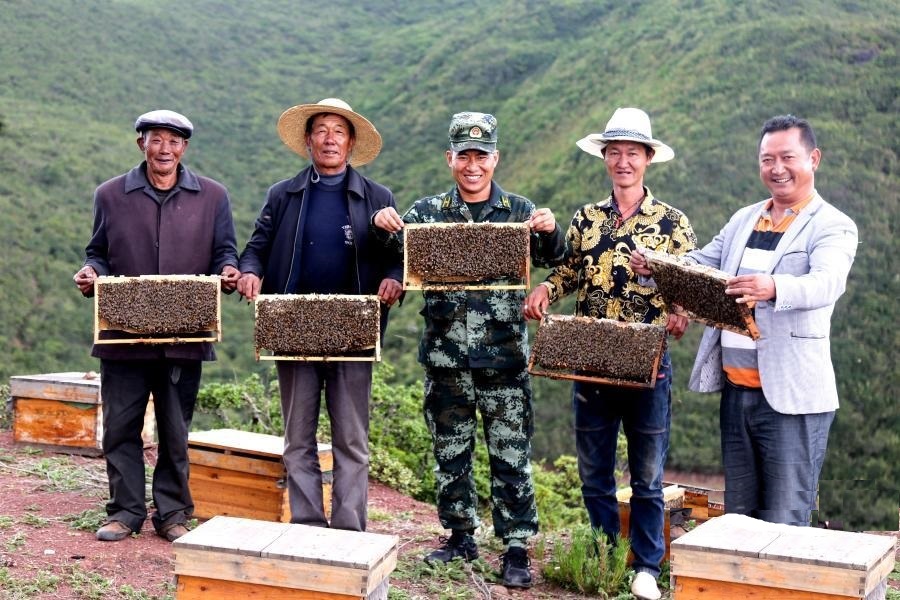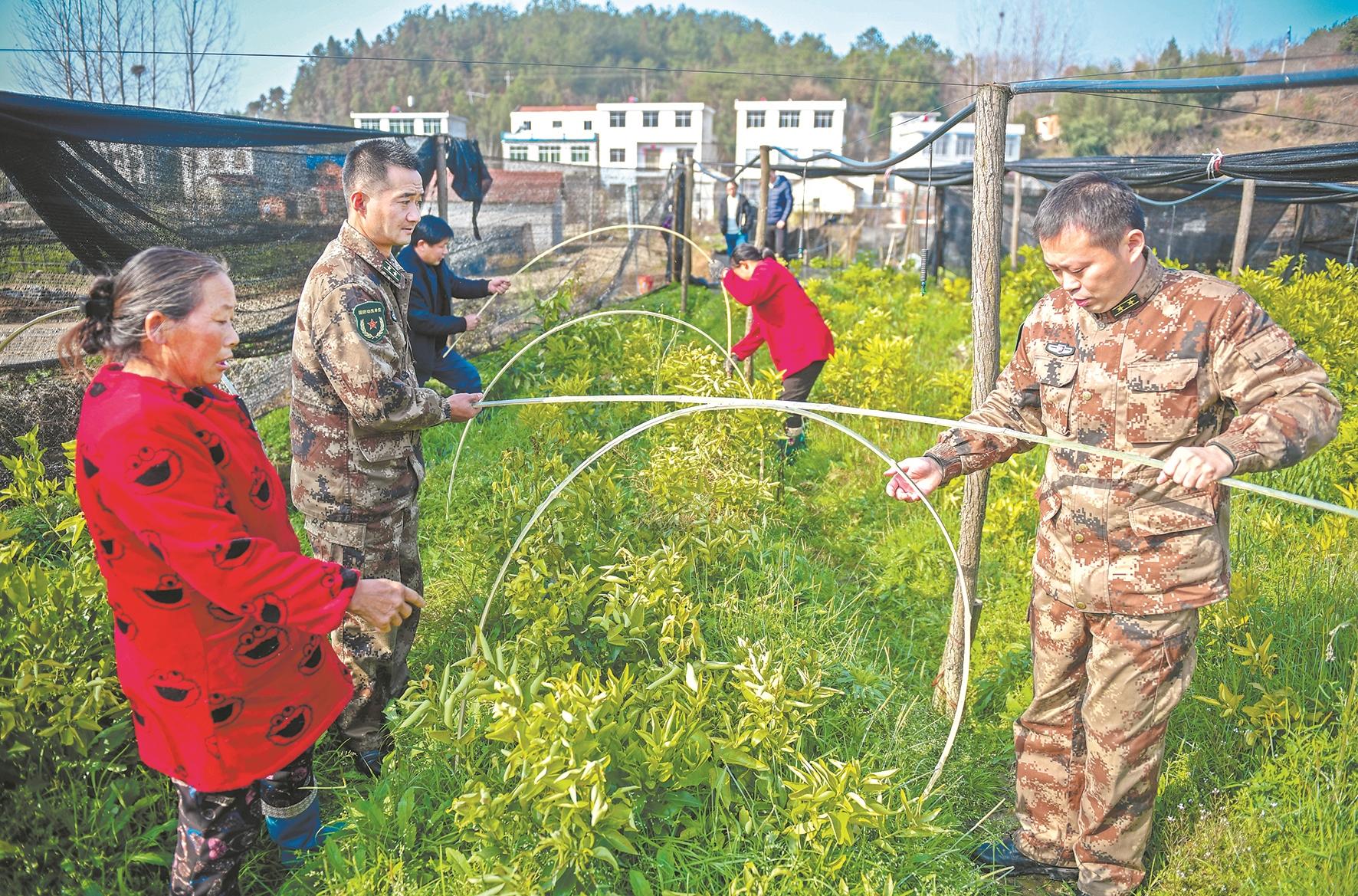Since China adopted the reform and opening up policy four decades ago, China’s economy has seen great development. However, the number of people living in extreme poverty was still huge. Over the past eight years, the government of China has stepped up its war on poverty and the remaining 99 million impoverished rural residents have all been lifted out of poverty. The country has met the poverty eradication target set in the United Nations’ 2030 Agenda for Sustainable Development 10 years ahead of schedule.
In China’s recent war on poverty, members of the Chinese People’s Liberation Army (PLA) are at the front line. They have helped 4,100 impoverished villages all around the country, especially in old revolutionary base areas, ethnic minority areas, border areas and the poorest areas. They have explored several practical approaches based on local conditions, such as developing suitable industries, promoting education, and medical assistance.
Army Boosts Villages on Path to Better Life
Shawa Village, located in southwest China’s Yunnan Province, is an ancient village of the Nu ethnic group. As of 2017, more than 75 percent of the people there were still living in poverty. Only in two years, however, all people in Shawa Village shook off extreme poverty with the help of Yunnan Provincial Military Area Command. How did they manage to do that? What was the military’s role in China’s poverty eradication?
The military command stationed there initiated the fight against poverty through educations. They built the first kindergarten in the village where kids could receive formal pre-school education. Military officers were even sent to assist in teaching the kids.
Another important task is to transform the old mindset of the villagers. With over 90 percent of the village on slope farmland, planting corn didn’t bring much benefit to the villagers and repeatedly caused mudslides and landslides. The military command invited agricultural experts and tried to provide skills training for villagers to develop a kiwi fruit industry based on the conditions of the village. But at the beginning, many villagers were not interested in doing so. They got used to “living at the mercy of the weather”. They would rather be poor than trying out new things.

A Chinese military officer with beekeepers
This was when militia members could help. A joint military-civilian unit was formed and mobilized to persuade villagers. They helped each household to plant kiwis of around 1 hectare on a trial basis. It might not be a large one, but was meaningful. The ancient village finally broke the traditional thinking and took the first step.
Now the village’s kiwi plantation has been largely expanded and a cooperation mechanism was founded led by militia members. In December 2019, all people of the Nu ethnic group in Shawa Village finally shook off poverty with the help of the military command.
Shawa Village was just one of the thousands of villages that had benefited from the relentless efforts of the military.
In a village in Xinjiang Uygur Autonomous Region in northwest China, the PLA Army helped build a poverty alleviation industrial park, which quadrupled villagers’ income.
The PLA Navy launched programs to boost the sale of products from poor areas, which increased the yield and villagers’ income.
In a village in Shaanxi Province which is also in northwest China, the PLA Air Force assisted in building 231 greenhouses. Large-scale planting and breeding industries have generated income of over RMB 5 million yuan (about $700,000) for locals.
The military altogether has helped build 1,710 schools, 1,458 clinics and supported 8,351 industrial projects, covering breeding and planting, processing of agricultural products, rural tourism, and PV power generation.
In all the 4,100 villages where the military has been stationed, officers and soldiers have not let the people down. As of the end of May 2020, they had lifted 924,000 people in 293,000 low-income households out of poverty, enabling them to start brand-new lives.
Foreign Cadets Observe China’s Poverty Alleviation
In 2020, more than 50 cadets from 30 countries under training in China Army Logistics University (ALU) paid a visit to the Zhongling Village in Chongqing Municipality in southwestern China. This village, surrounded by high mountains and deep valleys, began to fight poverty with the help of ALU from 2017. After feasibility study, ALU found that the unique natural resource of village is very suitable for beekeeping. The local government provided infrastructures such as road building and internet access and ALU sent experts in finance, economics and agriculture. With the help of the army and the local government, the village established an enterprise, created their own honey brand, and achieved annual income of 540,000 yuan in 2019.
The moving story of poverty alleviation aroused great interest among the foreign cadets.
“The army under the leadership of CPC is devoted to serving the people, and China’s targeted poverty alleviation policy is worth studying,” said Major Kasturi Mudiyanselag Salman Felicien, from Sri Lanka.
“China is an active contributor to world poverty reduction, and African countries can learn from China’s experience,” wrote Lieutenant Ndavana Fabiola Keisha, from Gabon, in his notebook after the trip.
The “Winning Formula”
Some experts decode the “winning formula” in China’s anti-poverty fight as “5Ds”: Determined Leadership, Detailed Blueprint, Development Oriented, Data-based Governance and Decentralized Delivery.
With the common goal of eliminating extreme poverty, several generations of Chinese leaderships have drawn strategic blueprints and led the nation in successive struggles, which ensured policy continuity and spurred the entire country to work together toward a unified goal.
Meanwhile, China has long prioritized economic development in its war on poverty, which is combined with proactive, precise poverty reduction practices that directly pass on the benefits of economic development to every poor household and eliminate poverty completely.

The PLA helping improve agricultural technology
The Chinese government has also attached particular importance to big data and the digital economy and emphasized the application of advanced digital management, which made China’s poverty alleviation success possible in a relatively short period of time.
Last but not least, a report attributed the effective implementation of poverty alleviation policies to the “decentralized” nature of China’s governance structure, featuring many improvisations at sub-national levels to implement national policies.
In China’s war on poverty, the PLA has played a unique and significant role, as whose motto is to serve the people whole-heartedly. They are part of the joint efforts to ensure that on the road to prosperity, no one will be left behind.